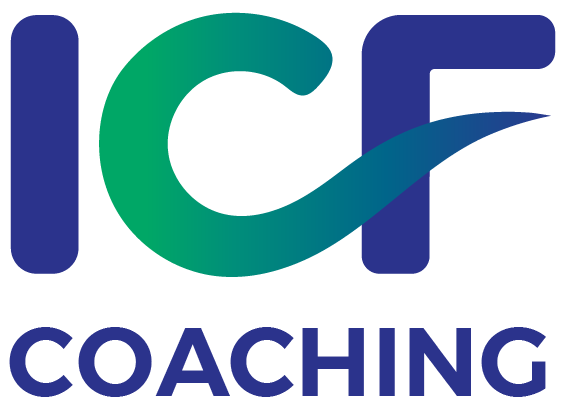Table of Contents
ToggleThe Power of Professional Coaching and Personal Development: A Whole New World
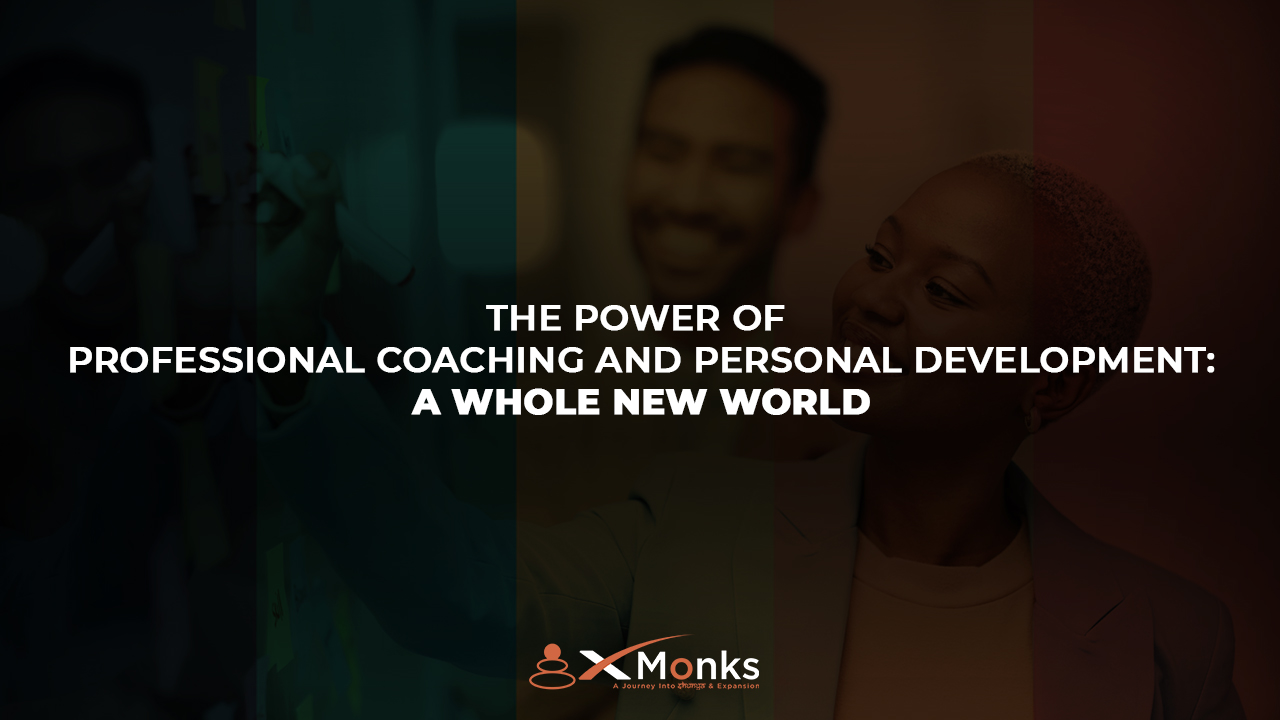
In the whirlwind of our rapidly changing world, where the pace of life often feels like a relentless current, the journey of personal and professional growth emerges as a beacon of hope and transformation. It’s a journey not merely of ambition, but of the soul’s yearning to evolve, to transcend the ordinary, and to reach for something more profound and fulfilling. Whether your path leads you towards the heights of corporate success, the art of leadership, or the simple yet profound desire to enhance the tapestry of your daily existence, the guiding hand of a professional coach becomes a vital compass.
This relationship is not just a partnership but a dance of discovery and empowerment. In the world of professional coaching, a personal development coach offers more than just direction; they provide a sanctuary of wisdom and a wellspring of inspiration, encouraging you to explore the depths of your potential. With their guidance, you begin to see beyond the obstacles, transforming challenges into opportunities for growth. In this sacred space, you are not only supported but held accountable, ensuring that every step you take is purposeful and aligned with your deepest aspirations.
Here, the journey is not just about achieving goals, but about awakening the dormant possibilities within you, unlocking the treasure trove of talents and strengths that lie beneath the surface. It is in this unfolding that you find not just success, but a life rich with meaning, purpose, and boundless potential.
One of the most impactful forms of coaching that has gained significant traction in recent years is that of a personal development coach. These professionals focus on helping clients grow in various aspects of their lives, from career advancement to emotional well-being, thereby creating a holistic approach to personal and professional success.
Understanding Professional Coaching
Professional coaching is a partnership between a coach and a client designed to help the client achieve specific goals. Unlike traditional therapy or counselling, which often focuses on past experiences and emotional healing, professional coaching is future-oriented. It focuses on identifying and achieving specific objectives, whether they relate to career advancement, personal growth, or overcoming specific challenges.
In professional coaching, coaches are trained to ask the right questions, provide feedback, and create a supportive environment where clients can explore their potential. They help clients identify their strengths and weaknesses, set realistic goals, and develop actionable plans to achieve those goals. The result is a more focused, motivated, and successful individual.
Making Time for Professional Coaching
Given the present day pace of things, the demands of work and personal life often leave little room for self-improvement. Yet, investing time in professional coaching can be one of the most rewarding decisions you make for your career and personal growth. Making time for professional coaching is not just about squeezing another activity into your already busy schedule; it’s about prioritising your future, enhancing your skills, and achieving your full potential.
The Importance of Professional Coaching
Professional coaching is a powerful tool for personal and professional development. It offers a structured approach to setting and achieving goals, improving performance, and developing leadership skills. A coach provides personalised guidance, helping you navigate challenges, enhance your strengths, and address weaknesses. The insights gained from coaching can lead to greater job satisfaction, career advancement, and a more balanced life.
However, many professionals struggle with the idea of making time for coaching. The pressure of deadlines, meetings, and other responsibilities can make it seem impossible to carve out time for self-reflection and growth. But the benefits of professional coaching far outweigh the time investment.
Prioritising Coaching in Your Schedule
One of the first steps in making time for professional coaching is to recognise its importance. Just as you would schedule time for a crucial meeting or a doctor’s appointment, it’s essential to prioritise coaching sessions. View these sessions as an investment in your future. By setting aside time for coaching, you’re dedicating time to your personal development, which can lead to long-term success.
Consider the impact that coaching can have on your career. A professional coach can help you clarify your goals, develop strategies to achieve them, and hold you accountable. This support can be invaluable in helping you overcome obstacles and reach your full potential. By making coaching a priority, you’re taking a proactive approach to your career development.
Integrating Coaching into Your Routine
Finding time for coaching doesn’t mean overhauling your entire schedule. Instead, look for ways to integrate coaching into your existing routine. For example, you could schedule coaching sessions during your lunch break, early in the morning, or after work. Some professionals find it helpful to set aside a specific day and time each week for coaching, treating it as a non-negotiable commitment.
Another approach is to combine coaching with other activities. For instance, if you have a long commute, you could use that time to engage in coaching sessions via phone or video call. By being creative with your schedule, you can make time for coaching without feeling overwhelmed.
Overcoming Common Barriers
One of the most common barriers to making time for coaching is the belief that you’re too busy. However, it’s important to remember that professional coaching is an investment in yourself. The time you spend on coaching can lead to improved performance, increased productivity, and a greater sense of fulfilment in your career.
Another barrier is the fear of being judged. Some professionals worry that seeking coaching may be perceived as a sign of weakness. However, coaching is widely recognised as a valuable tool for personal and professional development. Many successful leaders and executives credit their success to the support they received from a coach. By seeking coaching, you’re demonstrating a commitment to your growth and development.
The Long-Term Benefits of Coaching
Making time for professional coaching can lead to significant long-term benefits. Coaching can help you develop the skills and mindset needed to succeed in your career. It can also provide you with the tools to manage stress, improve work-life balance, and achieve your personal and professional goals.
In addition to these benefits, coaching can also enhance your leadership abilities. A professional coach can help you develop the skills needed to lead and inspire others. This can lead to greater job satisfaction, career advancement, and a more fulfilling life. This blog will go into the benefits of professional coaching a bit further on.
In conclusion, making time for professional coaching is an investment in your future. By prioritising coaching, you’re taking a proactive approach to your personal and professional development. Whether you’re looking to advance in your career, improve your leadership skills, or achieve a better work-life balance, coaching can provide you with the support and guidance you need to succeed.
The Role of a Personal Development Coach
While professional coaching encompasses a broad range of areas, personal development coaching zeroes in on the individual’s overall growth. A personal development coach works with clients to improve various aspects of their lives, including self-awareness, emotional intelligence, work-life balance, and even relationships. The goal is to help clients become the best version of themselves, both personally and professionally.
A personal development coach often works with clients on issues such as stress management, confidence-building, and time management. They also help clients identify their values, strengths, and passions, and then align their goals with these core aspects of their identity. This holistic approach ensures that the client is not only successful in their career but also fulfilled and happy in their personal life.
The Intersection of Professional Coaching and Personal Development
The beauty of professional coaching and the world of a personal development coach is that they often intersect. A personal development coach can help an individual develop the skills and mindset needed to succeed in their professional life. Similarly, professional coaching can help an individual overcome personal challenges that are holding them back in their career.
For example, a personal development coach might work with a client to improve their self-confidence. This newfound confidence can then be applied to the client’s professional life, helping them take on new challenges and advance in their career. On the flip side, a professional coach might help a client develop better time management skills, which can reduce stress and improve the client’s overall well-being.
The Benefits of Professional Coaching
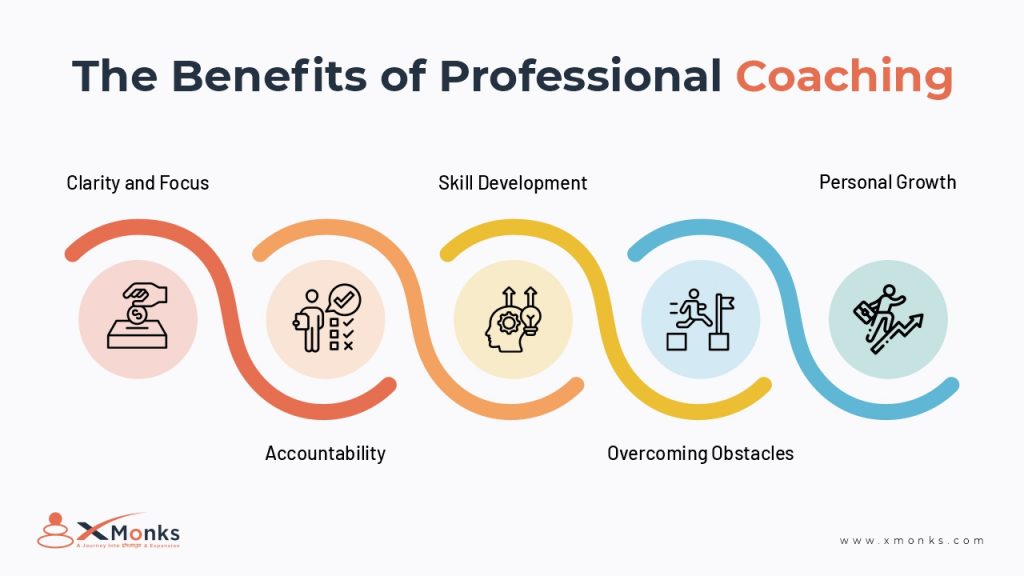
The benefits of professional coaching are numerous and can have a lasting impact on an individual’s life. Here are some of the key advantages:
- Clarity and Focus: A professional coach can help you gain clarity on your goals and focus on what’s most important. By setting clear, actionable goals, you can avoid distractions and stay on track to achieve your objectives.
- Accountability: One of the biggest challenges in personal and professional growth is staying motivated and accountable. A coach provides the support and accountability you need to stay committed to your goals.
- Skill Development: Professional coaches can help you develop specific skills that are essential for success. Whether it’s leadership, communication, or time management, a coach can provide the tools and techniques you need to improve.
- Overcoming Obstacles: We all face challenges and obstacles in our lives, but a professional coach can help you navigate these difficulties and find solutions. They provide an objective perspective and can help you see things from a different angle.
- Personal Growth: Ultimately, professional coaching is about personal growth. By working with a coach, you can become more self-aware, confident, and resilient, which will benefit you in all areas of your life.
The Benefits of Having A Personal Development Coach
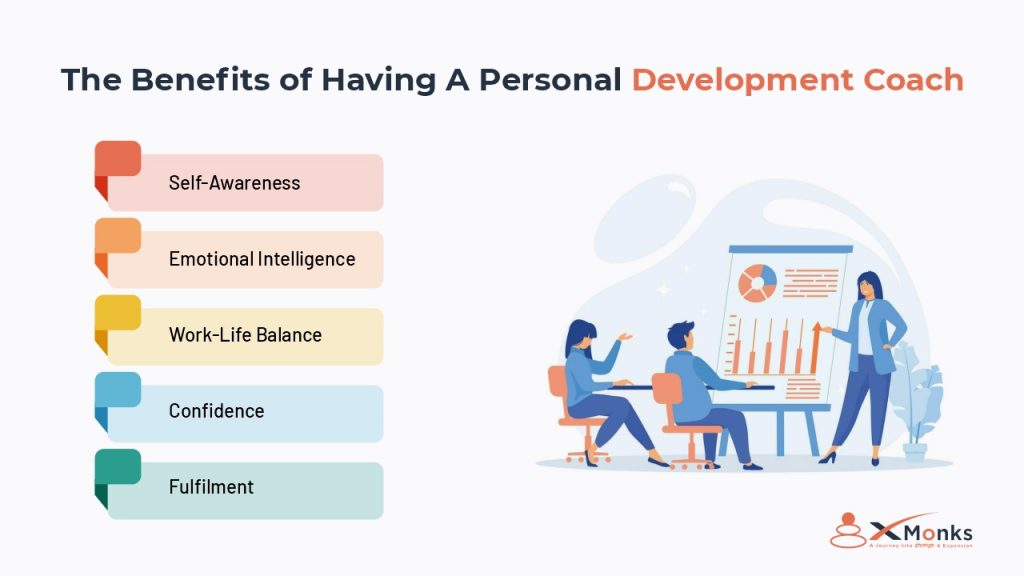
Just as professional coaching has its benefits, so too does having a personal development coach. Here are some of the key advantages:
- Self-Awareness: A personal development coach helps you become more self-aware. By understanding your strengths, weaknesses, and values, you can make better decisions and live a more fulfilling life.
- Emotional Intelligence: A personal development coach can help you develop emotional intelligence, which is essential for building strong relationships and managing stress.
- Work-Life Balance: One of the biggest challenges many people face is finding a balance between work and personal life. A personal development coach can help you create a balance that works for you, so you can enjoy both professional success and personal happiness.
- Confidence: Personal development coaching can help you build confidence in yourself and your abilities. This confidence can then be applied to all areas of your life, helping you achieve your goals and overcome challenges.
- Fulfilment: Ultimately, a personal development coach is all about helping you live a more fulfilling life. By aligning your goals with your values and passions, you can create a life that is meaningful and satisfying.
How to Choose the Right Coach
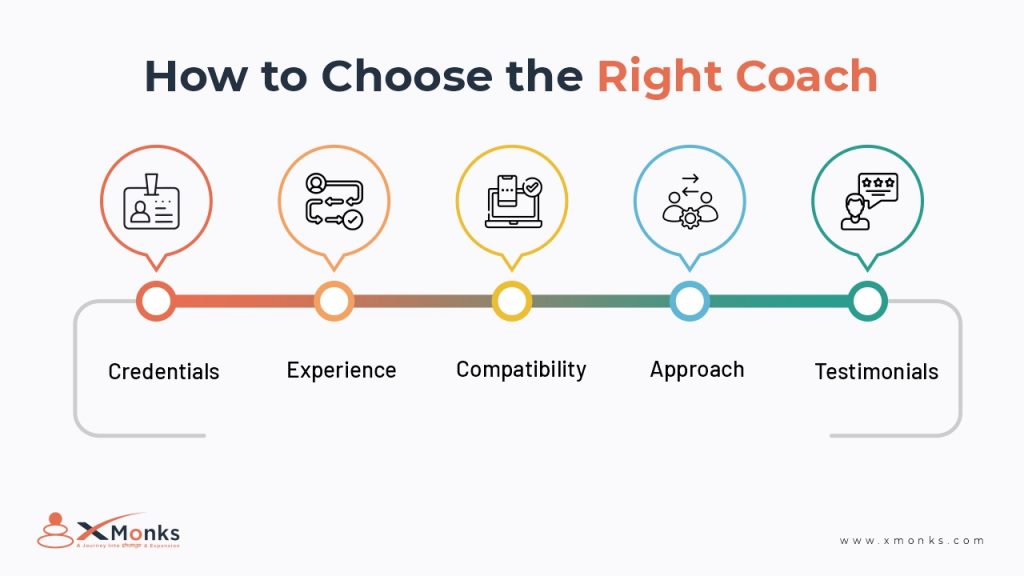
Choosing the right coach is essential to getting the most out of your coaching experience. Here are some tips for finding the right coach for you:
- Credentials: Look for a coach who is certified by a reputable organisation, such as the International Coach Federation (ICF). Certification ensures that the coach has received proper training and adheres to a code of ethics.
- Experience: Choose a coach who has experience working with clients in your specific area of need. Whether it’s professional coaching or working with a personal development coach, experience matters.
- Compatibility: It’s important to choose a coach with whom you feel comfortable and connected. A good coach-client relationship is built on trust and mutual respect.
- Approach: Different coaches have different approaches to coaching. Some may be more directive, while others may take a more collaborative approach. Choose a coach whose style aligns with your preferences.
- Testimonials: Look for testimonials or reviews from previous clients. This can give you insight into the coach’s effectiveness and the results they have helped clients achieve.
How to Choose the Right Coach
In an era of rapid change and constant innovation, a personal development coach has become an essential resource for individuals seeking to advance their careers and personal growth. However, despite the clear benefits of working with a coach, there are modern-day challenges that can make the process more complex than it initially appears.
Navigating the Digital Landscape
One of the most significant challenges in today’s coaching environment is the shift to digital platforms. With the rise of remote work and virtual communication, many coaching sessions now take place online rather than in person. While this offers greater flexibility and accessibility, it can also lead to challenges in building rapport and maintaining engagement. The lack of face-to-face interaction can make it more difficult for coaches to read body language, gauge emotions, and establish a strong connection with their clients.
Additionally, the digital landscape presents challenges related to technology. Technical issues such as poor internet connections, software malfunctions, or unfamiliarity with digital tools can disrupt coaching sessions and hinder progress. For both coaches and clients, adapting to this new mode of communication requires patience and a willingness to embrace new technologies.
Balancing Personalisation with Scalability
Another challenge in the modern coaching environment is the balance between personalisation and scalability. As the demand for professional coaching increases, many coaches are taking on more clients, leading to concerns about the quality and personalisation of their services. While some coaches may offer group sessions or pre-recorded content to accommodate more clients, these approaches may not provide the same level of individualised attention as one-on-one coaching.
For clients, this means being discerning when selecting a personal development coach. It’s important to choose a coach who can provide the level of personalisation needed to address your specific goals and challenges. At the same time, coaches must find ways to scale their services without compromising the quality of their coaching.
Managing Expectations
In today’s fast-paced world, there is often a desire for quick results. This can lead to unrealistic expectations when it comes to hiring a personal development coach. Some clients may expect immediate breakthroughs or rapid career advancements after just a few sessions. However, coaching is a process that requires time, effort, and commitment. It involves setting realistic goals, developing actionable plans, and making gradual progress over time.
Managing these expectations is a key challenge for coaches. It’s important for coaches to communicate clearly with their clients about what they can realistically achieve through coaching and to emphasise the importance of patience and persistence. Clients, on the other hand, need to approach coaching with an open mind and a willingness to put in the necessary work.
Dealing with Resistance
Another challenge that both coaches and clients may encounter is resistance to change. Working with a personal development coach often involves exploring new ideas, challenging existing beliefs, and stepping out of one’s comfort zone. This can be uncomfortable for some clients, leading to resistance or reluctance to fully engage in the coaching process.
Coaches must be skilled in addressing this resistance and helping clients overcome their fears and doubts. This requires empathy, active listening, and the ability to build trust. For clients, it’s important to recognise that growth often involves discomfort and to be open to the changes that coaching can bring.
The Pressure to Demonstrate ROI
In the modern world, there is often pressure to demonstrate the return on investment (ROI) when working with a personal development coach. Companies and individuals alike want to see tangible results from their investment in coaching, whether it’s in the form of increased productivity, improved leadership skills, or career advancement. This can create pressure for coaches to deliver quick wins and measurable outcomes.
However, the true value of coaching often lies in the long-term impact it has on an individual’s personal and professional growth. While it may be challenging to quantify this impact in the short term, it’s important for both coaches and clients to recognise that the benefits of coaching may not always be immediately visible. Building a strong foundation for future success often takes time, and the results of coaching may manifest gradually over months or even years.
In conclusion, while working with a personal development coach can offer significant benefits, it also comes with its own set of challenges. Navigating the digital landscape, balancing personalisation with scalability, managing expectations, dealing with resistance, and demonstrating ROI are all factors that can impact the coaching process. By being aware of these challenges and approaching coaching with an open mind, both coaches and clients can work together to achieve meaningful and lasting growth.
The Future of Professional Coaching and Personal Development
As the world continues to evolve, so too does the field of professional coaching and personal development. With advances in technology and a growing awareness of the importance of mental health and well-being, coaching is becoming more accessible and personalised than ever before.
One of the biggest trends in the coaching industry is the rise of virtual coaching. Thanks to technology, coaches can now work with clients from anywhere in the world. This has made coaching more accessible to people who may not have had access to it before. Virtual coaching also offers flexibility, allowing clients to schedule sessions at times that work best for them.
Another trend is the increasing emphasis on holistic coaching. As people become more aware of the importance of mental, emotional, and physical well-being, coaches are taking a more holistic approach to their work. This means addressing not just the client’s professional goals, but also their overall well-being.
Finally, there is a growing demand for specialised coaching. As more people seek out coaching for specific areas of their lives, such as career transitions, leadership development, or health and wellness, coaches are becoming more specialised in their offerings. This allows clients to work with coaches who have expertise in their specific area of need.
FAQs
Conclusion
In conclusion, professional coaching and having a personal development coach offer powerful tools for personal and professional growth. Whether you’re looking to advance your career, improve your relationships, or simply live a more fulfilling life, working with a coach can help you achieve your goals.
By providing clarity, accountability, and support, a professional coach can help you navigate the challenges of life and unlock your full potential. Similarly, a personal development coach can help you become more self-aware, confident, and fulfilled.
As the world continues to evolve, the field of coaching will continue to grow and adapt, offering new opportunities for individuals to achieve their goals and live their best lives. Whether you’re seeking professional coaching, a personal development coach, or both, the benefits are clear: a more focused, motivated, and successful you.
In a world where success is often measured by titles and accolades, it’s easy to overlook the power of personal growth. Yet, it is this very growth that lies at the heart of true fulfilment. So, whether you’re looking to climb the corporate ladder or simply find more joy in your daily life, remember that the journey is just as important as the destination. And with the right coach by your side, that journey becomes a path of discovery, empowerment, and lasting success.
